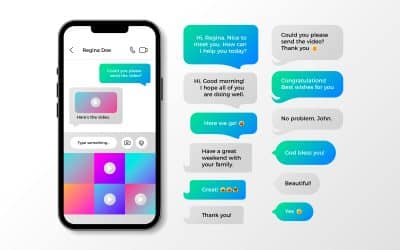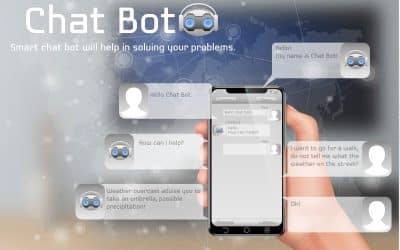Engagement with customers is an essential element of a business’s success. Your interactions with your customers can make the difference between your company’s image and reputation. Technological advancements have provided us with devices that have revolutionized customer interaction. In the current fast-paced world of digital companies, they always look for new ways to improve the customer experience and simplify the process.
A technology that has been gaining much attention in the past few times has been Artificial Intelligence (AI), especially in the form of Generative AI Chatbot. Conversational agents powered by AI have revolutionized customer interactions, and abbots have been necessary for companies seeking to remain ahead of the increasingly competitive marketplace. Chatbots are changing marketing and customer service selling strategies in different sectors, from offering instant support to personalized recommendations.
In this post, we’ll explore AI chatbot development and services and how AI chatbots help companies in customer engagement.
Understanding AI Chatbot Development Services
AI chatbot development services cover all aspects of creating, developing, building, and deploying AI-powered chatbots. Chatbots are programs written in computers that use AI algorithms to emulate human conversations. They offer answers to users’ queries and engage in meaningful conversations. AI chatbots can integrate into various platforms, including mobile apps, message applications, websites, and voice assistants.
They are always available to answer customer questions, provide solutions, and offer the information required. They employ artificial intelligence techniques to recognize their surroundings, process, and react using natural language inputs. The primary purpose of voice- or text-based chatbots is to create an easy, human-like interface for users to interact with robots for various motives.
Below are chatbot applications that are commonly used, with examples of their functionality:
Automated Response Bots
Instantly respond to commonly requested customer queries regarding orders, shipping, accounts, etc. Ultimately, saving time and reducing human representatives’ requirement to handle these routine questions.
AI-Powered Virtual Assistants
Advanced NLP allows for more natural conversation and enhances interactions by being aware of context. It also provides relevant suggestions based on the user’s preferences and past.
Escalation Chatbots
Determine when a problem can’t be solved by automation and effortlessly connect customers with live help agents to assist in efficient human-powered problem-solving.
Lead Generation Chatbots
Gather and qualify information from leads via customized questions and discussions that help customers through the sales funnel.
Interactive Product Guide
They serve as virtual assistants to shoppers, helping them navigate catalogs, compare choices, and make informed buying decisions.
Feedback and Survey Chatbots
Conduct surveys to gather opinions and analyze the responses, thereby gaining insights to increase customer satisfaction.
Multilingual Support Chatbots
Connect with global audiences across multiple languages, breaking up barriers and boosting satisfaction.
Social Media Chatbots
Interact with customers through social networks to answer questions or complaints and provide support immediately.
Appointment Scheduling Chatbots
Remove the manual process of booking appointments and let customers schedule appointment times.
E-Commerce Recommendation Chatbots
Study buyer behavior and recommend appropriate products to promote sales, upsells, or cross-sells and achieve more tailored purchasing.
What Is The Process By Which AI Chatbots Operate?
At the core of every AI chatbot lies the natural processing of language (allowing computers to comprehend and interpret human languages. When users interact via the AI chatbot, the message is transmitted to a server and analyzed by algorithms that look for patterns. Then, significance is extracted from the words. Theo uses the information to create the correct response. This will be sent back to the user.
Companies employ machine learning strategies to increase efficiency and accuracy, which enables AI chatbots to gain knowledge from previous interactions. Over time, they will become better and smarter at dealing with complex customer requests.
Critical Components Of AI Chatbot Development Services
We’ll overview the essential parts that make up AI Chatbot Development Services.
Natural Language Processing (NLP)
NLP is the most fundamental element of AI chatbots, allowing them to read and comprehend human languages. The technology will enable chatbots to analyze user input, determine its meaning, and generate appropriate answers.
Machine Learning (ML)
Machine learning or ML algorithms can be used to train chatbots. This allows chatbots to enhance their response in time based on the user’s interaction, making them more precise and contextually aware.
User Interface (UI) Design
Making a user-friendly and intuitive interface for chatbots is vital for providing a great user experience. AI chatbot development includes creating the chatbot’s look and the flow of interactions.
Integration
Chatbots should be integrated seamlessly with existing systems and platforms. This requires connecting them to APIs, databases, and various software components that provide relevant information and execute functions.
Testing And Quality Assurance
Rough testing is necessary to ensure that chatbots work effectively, deliver accurate results, and handle various user situations efficiently. AI chatbot creators run extensive tests to discover the issues and fix them.
Deployment and Maintenance
Chatbots can be installed on the platforms they are designed for after being developed. Regular maintenance is vital to keeping the chatbot current, improving its performance, and resolving any issues.
Benefits Of AI-powered Chatbots In Customer Engagement
Chatbots are a great way to engage customers. Many benefits to companies looking to increase the customer experience:
24/7 Availability And Real-Time Support
One of the significant benefits of chatbots is their 24/7 accessibility. In contrast to human representatives who work restricted hours of operation, chatbots are able to provide immediate support and help to clients at any time. They will provide customers with quick responses to questions and improve customer satisfaction.
Enhanced Customer Experience And Satisfaction
Chatbots powered by AI can recognize customer habits, preferences, and past interactions. This allows the bots to offer personalized suggestions and bespoke user experiences. Chatbots provide real-time customer support, reducing customer wait time and increasing satisfaction through prompt and reliable responses to questions. Chatbots guarantee consistent quality of service and communication since they’re programmed to conform to specific branding guidelines.
Improved Customer Satisfaction
Chatbots increase the customer experience through their rapid response and personal interactions. Clients appreciate the convenience of immediate support and feel valued and appreciated.
Tailored Answers At Your Fingertips
The AI chatbot’s ability to give personalized, context-aware data to each question makes it different. This personalization level guarantees that the users don’t just get an answer that isn’t right for them but is tailored to their particular demands and concerns. This is like having a specialist in web design and digital marketing on call 24/7 and ready to offer advice and recommendations that fit the specific needs of your business.
Efficient And Scalable Support
Chatbots can respond to many customer inquiries simultaneously, without delay or waiting duration. They can respond immediately, resolve common issues, and forward complex questions to human support. The result is that customer service becomes easier and more scalable because businesses can handle large volumes of customer interaction without additional staff.
Handling Routine Inquiries
Chatbots developed by Chatbot Developer are adept at handling routine and repetitive inquiries. They can handle tasks like offering store hours, tracking orders, or resetting passwords. This frees human agents to tackle more complicated problems, improving customer care and engagement.
Cost Savings
Automating customer interactions with companies can reduce the necessity for a massive customer service staff, resulting in substantial savings. Chatbots can handle many queries in a single session, allowing companies to increase the size of their customer support operations with no need for additional employees.
Data Collection And Analysis
Chatbots gather valuable data about customers when they interact with them. The data collected can determine customers’ preferences and help businesses improve their offerings and services to meet customers’ needs.
Competitive Advantage
Accepting AI chatbot development can give businesses an edge. Businesses that offer efficient and personalized customer support via chatbots are likely to keep and attract customers in today’s highly competitive market.
The Current Impact Of AI-Based Chatbots
AI-powered chatbots have quickly become ubiquitous across industries ranging from healthcare and e-commerce to banking, travel & hotels. The widespread use of chatbots has brought tangible results and changed customer interaction in many ways.
E-Commerce
Chatbots used by online retailers help shoppers search for products, track orders, and provide after-purchase assistance. Chatbots can enhance your buying experience and boost the conversion rate with personalized suggestions and instant support.
Healthcare
Healthcare providers use chatbots to give medical advice, set appointments, and instruct patients. Virtual assistants ease the workload on medical professionals, reduce waiting times, and increase accessibility for healthcare providers.
Banking
Financial institutions and banks use chatbots to answer customer service questions, manage accounts, and assist with transactions. Chatbots also allow seamless funds transfers, balance inquiries, and security measures, which improve the customer’s overall banking experience.
Travel And Hospitality
Tourism and travel companies use chatbots for reservations, itinerary management, and concierge service. Chatbots simplify travel planning and increase customer satisfaction by providing real-time personalized travel recommendations and assistance.
Customer Service
For a range of sectors, Chatbots are the initial source of communication for customers’ questions, efficiently resolving problems and escalating complex issues to human representatives when needed. The ability of chatbots to offer immediate responses and consistent service increases customer satisfaction and retention.
Implementing Chatbots For Your Business
If you’re thinking of the use of chatbots in your company with the help of AI Chatbot Development Company, here are a few tips to help you get started:
Identify Goals
Set out the goals that you hope to achieve using chatbots. Do you wish to improve the customer experience, efficiency, or sales? A clear definition of your goals will direct your chatbot’s strategy.
Choose The Right Platform
Choose a framework or platform to build your chatbot. Options include chatbot-building platforms, custom-built development, and chatbots from third-party solutions. Your choice is contingent on your technical capabilities and requirements.
Develop And Train Your Chatbot
If you’re creating a chatbot entirely from scratch or altering an existing one, you’ll have to teach it how to recognize user questions and respond accordingly. This could involve creating a database with responses and setting up the natural language processing (NLP) features.
Test And Refine
Test your chatbot thoroughly for accuracy to ensure it functions exactly as you want. User feedback is crucial in this stage. Analyze user feedback to prepare to fine-tune and optimize your chatbot’s interactions.
Launch And Monitor
After your chatbot has been created and is ready to go live, you can launch it through the channels you prefer for communication. You can check its performance, accumulate details on users’ interactions, and then continue to refine your chatbot to improve user engagement.
Emerging Trends In AI-Based Chatbots: Shaping The Future Of Customer Engagement
Chatbots are now multifaceted devices that are changing how companies communicate with customers. With technology continuing to advance and evolve, various trends are shaping the trajectory for chatbots based on AI, which are changing customer engagement methods across different sectors. Here’s a look at the most significant trends driving the development of chatbot technology. They are impacting the future of customer interaction.
Voice-Activated Chatbots
The popularity of smart speakers, as well as virtual assistants such as Amazon Alexa and Google Assistant Voice-activated chatbots, are becoming more popular. They allow users to communicate using spoken commands that provide hands-free ease of use and access. With the advancement of natural technology for processing language (NLP) technology, chatbots activated by voice will offer better quality responses and smoother conversation.
Integration With Platforms For Messaging Platforms
Chatbots integrated into messaging platforms like WhatsApp, Facebook Messenger, and Slack have gained much traction as popular business communication tools. Chatbots allow companies to communicate with their clients through their preferred messaging applications by providing personalized help. Also conducting transactions, and offering support without switching between different platforms.
AI-Powered Chatbot Analytics
The business world recognizes data analytics’s value in understanding users’ behavior and improving chatbotance. Chatbot analytics powered by AI uses machine learning algorithms to analyze the data from conversations, spot trends, and gain actionable information. Through tracking metrics like levels of engagement, conversion rate, and satisfaction scores, businesses can constantly enhance the effectiveness of chatbots and customize chatbot interactions to satisfy the user’s needs for Internal Operations.
Apart from applications designed for customer interaction, Chatbots are now used for internal company functions. HR chatbots aid employees in things like requests for leave or the onboarding process and questions about policies, which streamline the administrative process and improve employees’ satisfaction. Additionally, IT helpdesk chatbots provide automatic support to resolve technical problems, decreasing fixing time and increasing efficiency.
Conversational Commerce
Conversational commerce, a concept that involves making transactions and purchases in chatbots, is growing in popularity. Chatbots with payment processing features allow users to search for products, make orders, and pay while staying on the same messaging platform. This creates a seamless shopping experience that simplifies purchasing and leads to higher company conversion rates.
Augmented Reality (AR) Integration
Chatbots that use AR (AR) technology give users an immersive and engaging experience. Chatbots powered by AR lets users experience products as they would in real environments, virtual clothes or accessories, and digital media with greater ease. The integration improves the buying experience, aids in product exploration, and boosts the conversion rate.
The Future Of AI-Based Chatbots
Technology continues to advance and advance; AI-based chatbots have much promise with a variety of trends and advances that are poised to influence their course:
- Chatbots will have enhanced abilities in analyzing and interpreting natural language. This will allow for more nuanced conversations and more precise responses.
- Chatbots are expected to incorporate multimodal features that allow interactions via text, voice, and visually based-inputs. This blend of modes can provide users greater freedom and ease of communication.
- Chatbots are expected to develop emotional intelligence. They will be able to sense and address the user’s emotional responses. By empathizing with the user and altering their tone and behavior accordingly, they will build stronger connections and increase confidence.
- Chatbots seamlessly connect to Internet of Things (IoT) devices. This will enable users to communicate with smart home appliances, automation systems, and other connected devices using natural spoken commands.
- Chatbots in the future will use sophisticated data analytics and machine learning algorithms to provide highly personalized experiences tailored to each user’s behavior, preferences, and even context.
- Chatbots can be creative in creating content, developing specific recommendations, and creating captivating conversations. It blurs the distinction between content created by humans and machines.
- Chatbots can cooperate with human agents and other AI systems to enhance human capabilities and harness AI’s collective power to tackle complicated problems. They will also provide better user experiences.
Conclusion
AI chatbot development is becoming essential to businesses that want to offer outstanding customer service, increase the efficiency of their operations, and gain an edge in the market. Conversational agents powered by AI transform the way businesses communicate with their customers by offering prompt and personal support 24/7. Since the need for AI chatbots has increased, AI chatbot development companies remain at the forefront of development, delivering custom solutions that meet the specific requirements of companies across a range of sectors.
Chatbots and AI continue transforming customer interaction by providing individualization, accessibility, quick answers, multilingual support, better insights, enhanced integration features, active engagement, and cost efficiency. When businesses are increasingly leveraging these new technologies, they’re not just meeting but meeting or exceeding customers’ expectations, increasing growth, and achieving prosperity in the digital age. Adopting AI chatbot development and services isn’t merely a fashion and a tactical move that could transform how customers interact and boost business performance in a digital world.











